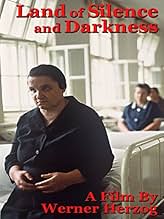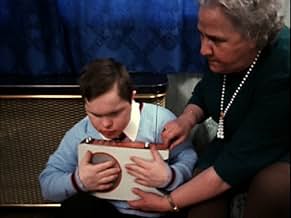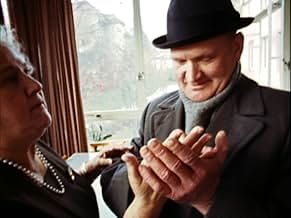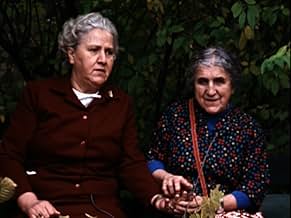El país del silencio y la oscuridad
Título original: Land des Schweigens und der Dunkelheit
CALIFICACIÓN DE IMDb
7.9/10
3.4 k
TU CALIFICACIÓN
Una mujer ciega y sorda desde la adolescencia muestra sus frustrados intentos de comunicación con una sociedad incapaz de ver en sí misma idénticas limitaciones.Una mujer ciega y sorda desde la adolescencia muestra sus frustrados intentos de comunicación con una sociedad incapaz de ver en sí misma idénticas limitaciones.Una mujer ciega y sorda desde la adolescencia muestra sus frustrados intentos de comunicación con una sociedad incapaz de ver en sí misma idénticas limitaciones.
- Dirección
- Guionista
- Elenco
- Premios
- 1 premio ganado y 1 nominación en total
- Dirección
- Guionista
- Todo el elenco y el equipo
- Producción, taquilla y más en IMDbPro
Opiniones destacadas
Herzog's documentary is a stunning revelation of what it means to be human. When we first see the profoundly disabled people on the screen, we shy away from them, disturbed to consider that these creatures might be people like ourselves. But through the love of the woman whose work Herzog captures here, we discover them as precisely what they -- and we -- are: human brothers and sisters endowed by God with both the need for love and an unimpaired (despite physical handicaps) capacity to love. Watching this movie some 20 years ago, I found this remarkable film one of the most exhilarating cinematic experiences of my life (and I'm now 55 and a veteran of many, many movies, and this film retains its wondrous place in my memory), a testament to the unity of the universal human family told with the artist's -- Herzog's -- aesthetic objectivity, yet clearly giving voice to a passionate embrace and advocacy of life, no matter how physically disabled.
Land of Silence and Darkness was Werner Herzog's first documentary. He still had a little bit of ways to go in terms of his style in a straightforward mode; the same year he made an experimental abstract documentary called Fata Morgana that showed him already a master of "directing landscapes" and getting a mood and setting that was unique. With LOS&D it's a little different- it's a little like the German equivalent of one of those touching documentaries that are on HBO every now and then. He's mostly there not to make any grand visual statements or ubiquitous metaphors, but to capture this insulated world where people survive against all obstacles. It's in the Herzog vein of thought and execution, of showing painfully human beings who've been unfortunately by no fault of their own into a fringe group where the act of communication has to be an obstacle itself, that the film is most powerful. Fini Straubinger is one of those gentle, courageous souls that deserves to be shown more in film, and Herzog has her pegged as a good subject- someone who communicates to those who have none (dead-blind boys from birth who barely know how to swallow let alone learn the alphabet or 'good' or 'bad') all through hand-pointing.
While Herzog lays on the orchestral strings over scenes that could be silent themselves, the people speak volumes about how the spirit of humanity and the goodness of human beings can live on in the right circumstances. There's a subtext that Herzog reaches at well of the neglect the people have been served, of some people like the woman who used to use braille but forgot and are put wrongfully in sanitariums, when they could be in the right care functional up to a point in society. So there is that part that is a running theme in most of Herzog's work that's striking, the society at large with the stragglers, those that are just trying to keep up. And out of this he makes at least a few moments, without much interference, into little moments of documentary poetry, like the boy who is ambivalent but finally does go around in the pool and feels ecstatic about being under a shower. Or the simple composition of the young man who can barely eat a banana, but merely the slightest bit of work from Fini gets him reacting.
Wedging on the line between unsentimental and sentimental is a hard thing to do with a group like this, and on a first feature-length documentary Herzog tries and for the most part makes it a brave turn on a subject neglected and bright and moving. It makes sense he would say that this is the one film he's made in decades that he wants to be available most; ironically it is overshadowed by the more astounding (if more crowd-pleasing) work with Grizzly Man and Little Dieter. Even if it isn't a great film, it is a must-see, which is rare in documentary film.
While Herzog lays on the orchestral strings over scenes that could be silent themselves, the people speak volumes about how the spirit of humanity and the goodness of human beings can live on in the right circumstances. There's a subtext that Herzog reaches at well of the neglect the people have been served, of some people like the woman who used to use braille but forgot and are put wrongfully in sanitariums, when they could be in the right care functional up to a point in society. So there is that part that is a running theme in most of Herzog's work that's striking, the society at large with the stragglers, those that are just trying to keep up. And out of this he makes at least a few moments, without much interference, into little moments of documentary poetry, like the boy who is ambivalent but finally does go around in the pool and feels ecstatic about being under a shower. Or the simple composition of the young man who can barely eat a banana, but merely the slightest bit of work from Fini gets him reacting.
Wedging on the line between unsentimental and sentimental is a hard thing to do with a group like this, and on a first feature-length documentary Herzog tries and for the most part makes it a brave turn on a subject neglected and bright and moving. It makes sense he would say that this is the one film he's made in decades that he wants to be available most; ironically it is overshadowed by the more astounding (if more crowd-pleasing) work with Grizzly Man and Little Dieter. Even if it isn't a great film, it is a must-see, which is rare in documentary film.
Story of Fini Straubinger who is "trapped" in her own body being both deaf and blind. Since the condition came on later in life she is able to speak and tells us what its like. We also watch as she goes around helping those like her. Communication is done via touching or writing on the hands. It becomes clear that the people in the film with this condition are trying to live full lives. An amazing film that shows us what its like not to be able to hear or see. Hopeful and yet unnerving-its not a state one really wants to contemplate having-its an important film since we see the world with a different set of eyes. Taking the matter even further Herzog and his crew also show us what its like for people born deaf and blind and how hard it is for them to even learn the basic things we take for granted. Moving. Haunting. Worth a look since it will make you reflect on how we get along.
'Land of Silence and the Darkness', written and directed by Werner Herzog, is an extraordinary documentary -- remember that word, please -- about Fini Straubinger. As a child in Germany, she suffered a terrible fall which caused a popping sensation in her neck. She was afraid to tell her parents (I can well believe this), so the injury was never treated. As a teen, she progressively lost her hearing and her sight, becoming totally deaf and blind. When Herzog made this film, Straubinger was well past middle age, and had spent most of her life in silence and darkness.
Americans who see this film will be reminded of Helen Keller. But Keller lost her sight and hearing (to scarlet fever) in very early childhood, and retained only very slight memory of her stolen senses. (Touchingly, Keller did recall seeing the rainbows formed by sunlight refracted through the crystal prisms of her mother's chandelier.) Because Straubinger retained a full memory and understanding of vision and sound, she became useful as an ambassador to the kingdoms of the blind and deaf. Fini Straubinger has dedicated her life to working with people who are deaf and blind, most of whom have borne those double handicaps either from birth or (like Keller) from infancy.
Herzog follows Straubinger on a trip through Germany, financed by an organisation for the deaf-blind. We see her communicating with other deaf-blind people through a sort of tapping code. Activities which the rest of us take for granted are truly alien experiences for these unfortunate souls. For instance, the simple act of taking a shower: for someone who has never experienced this before, and cannot have it adequately explained, the sudden onslaught of pressurised water is deeply terrifying. In the final sequence, we see a deaf-blind man hugging a tree: attempting to experience this alien life-form through his senses of touch, taste and smell.
One sequence, showing Straubinger interacting with a chimpanzee, I found unpleasant and unnecessary. I get the impression that this scene was staged by Herzog in an ill-thought attempt to inject some light 'comedy relief' into a subject that audiences might find deeply depressing.
I made a point of identifying this film as a documentary, meaning it's non-fiction. Indeed, Fini Straubinger is a real person: her blindness, her deafness, and (more importantly) her work with the deaf-blind are all real, all true. At one point in this film, Straubinger tells us that her most vivid sensory memory -- before the darkness and silence closed in -- is an image of the rapturous faces of ski jumpers as they leap into the sky. After this film was released, Herzog admitted in an interview that Straubinger had never seen a ski jumper: Herzog wrote those lines for her, because he felt that ski jumpers provided the visual symbol (I refuse to misuse the word 'metaphor') which would simultaneously represent sensory rapture and Straubinger's own isolation.
I reluctantly concede that this sort of fictionalisation is a valid device in documentary films. Those of us who are fortunate to see and hear cannot truly experience the dark silent world of Fini Straubinger and her colleagues. (Unless we too are conscripted into that realm, by accidents or illness.) Since this film can never truly put us into the mind of a deaf-blind person -- especially one who has been both deaf and blind since birth, like most of the people encountered here -- some degree of invention is necessary. I recall an anecdote told by Albert Einstein (too long to repeat here; send me an email if you want the details) concerning his attempt to explain milk to a blind man: this incident never actually occurred, but Einstein told the story to prove a point about his theory of relativity.
'Land of Silence and the Darkness' is a fascinating film about a fascinating human being. My rating: 8 out of 10.
Americans who see this film will be reminded of Helen Keller. But Keller lost her sight and hearing (to scarlet fever) in very early childhood, and retained only very slight memory of her stolen senses. (Touchingly, Keller did recall seeing the rainbows formed by sunlight refracted through the crystal prisms of her mother's chandelier.) Because Straubinger retained a full memory and understanding of vision and sound, she became useful as an ambassador to the kingdoms of the blind and deaf. Fini Straubinger has dedicated her life to working with people who are deaf and blind, most of whom have borne those double handicaps either from birth or (like Keller) from infancy.
Herzog follows Straubinger on a trip through Germany, financed by an organisation for the deaf-blind. We see her communicating with other deaf-blind people through a sort of tapping code. Activities which the rest of us take for granted are truly alien experiences for these unfortunate souls. For instance, the simple act of taking a shower: for someone who has never experienced this before, and cannot have it adequately explained, the sudden onslaught of pressurised water is deeply terrifying. In the final sequence, we see a deaf-blind man hugging a tree: attempting to experience this alien life-form through his senses of touch, taste and smell.
One sequence, showing Straubinger interacting with a chimpanzee, I found unpleasant and unnecessary. I get the impression that this scene was staged by Herzog in an ill-thought attempt to inject some light 'comedy relief' into a subject that audiences might find deeply depressing.
I made a point of identifying this film as a documentary, meaning it's non-fiction. Indeed, Fini Straubinger is a real person: her blindness, her deafness, and (more importantly) her work with the deaf-blind are all real, all true. At one point in this film, Straubinger tells us that her most vivid sensory memory -- before the darkness and silence closed in -- is an image of the rapturous faces of ski jumpers as they leap into the sky. After this film was released, Herzog admitted in an interview that Straubinger had never seen a ski jumper: Herzog wrote those lines for her, because he felt that ski jumpers provided the visual symbol (I refuse to misuse the word 'metaphor') which would simultaneously represent sensory rapture and Straubinger's own isolation.
I reluctantly concede that this sort of fictionalisation is a valid device in documentary films. Those of us who are fortunate to see and hear cannot truly experience the dark silent world of Fini Straubinger and her colleagues. (Unless we too are conscripted into that realm, by accidents or illness.) Since this film can never truly put us into the mind of a deaf-blind person -- especially one who has been both deaf and blind since birth, like most of the people encountered here -- some degree of invention is necessary. I recall an anecdote told by Albert Einstein (too long to repeat here; send me an email if you want the details) concerning his attempt to explain milk to a blind man: this incident never actually occurred, but Einstein told the story to prove a point about his theory of relativity.
'Land of Silence and the Darkness' is a fascinating film about a fascinating human being. My rating: 8 out of 10.
Land of Silence is a really great documentary, one of Herzog's best I must say. His other documentaries are a bit uneven, which his movies are not. But this one, as well as his recent "Little Dieter Needs to Fly", are amongst the most moving documentaries I've ever seen. And they are still unique, Werner Herzog's personal traits can be seen everywhere. The transcendent landscapes, pure human beings, humour, it's all there.
The text on the back cover explains the movie very well:
"Some who live in this land have learned to speak, though they communicate with each other by touch language: what they say comes from the most profound depths of human experience, and is often startingly beautiful and exiting. This is not a depressing movie at all. Neither is it a movie for voyeurs of the grotesque. As Anita Earle writes, 'It is, rather, a testament from another plane of existence'"
At some points in this movie I laughed. The camera often stays very long on lonely, depressing people who spend their days either sitting or lying down. But it wasn't meant to be comedy, it is a way for me to step back. It is a very 'close' picture, it really gets to you. You're thinking "Jesus", and you want to react. And still, it is an artwork.
The text on the back cover explains the movie very well:
"Some who live in this land have learned to speak, though they communicate with each other by touch language: what they say comes from the most profound depths of human experience, and is often startingly beautiful and exiting. This is not a depressing movie at all. Neither is it a movie for voyeurs of the grotesque. As Anita Earle writes, 'It is, rather, a testament from another plane of existence'"
At some points in this movie I laughed. The camera often stays very long on lonely, depressing people who spend their days either sitting or lying down. But it wasn't meant to be comedy, it is a way for me to step back. It is a very 'close' picture, it really gets to you. You're thinking "Jesus", and you want to react. And still, it is an artwork.
¿Sabías que…?
- ConexionesFeatured in Was ich bin, sind meine Filme (1978)
Selecciones populares
Inicia sesión para calificar y agrega a la lista de videos para obtener recomendaciones personalizadas
- How long is Land of Silence and Darkness?Con tecnología de Alexa
Detalles
- Fecha de lanzamiento
- País de origen
- Idioma
- También se conoce como
- Land of Silence and Darkness
- Locaciones de filmación
- Productoras
- Ver más créditos de la compañía en IMDbPro
- Tiempo de ejecución1 hora 25 minutos
- Mezcla de sonido
- Relación de aspecto
- 1.37 : 1
Contribuir a esta página
Sugiere una edición o agrega el contenido que falta

Principales brechas de datos
What is the English language plot outline for El país del silencio y la oscuridad (1971)?
Responda























